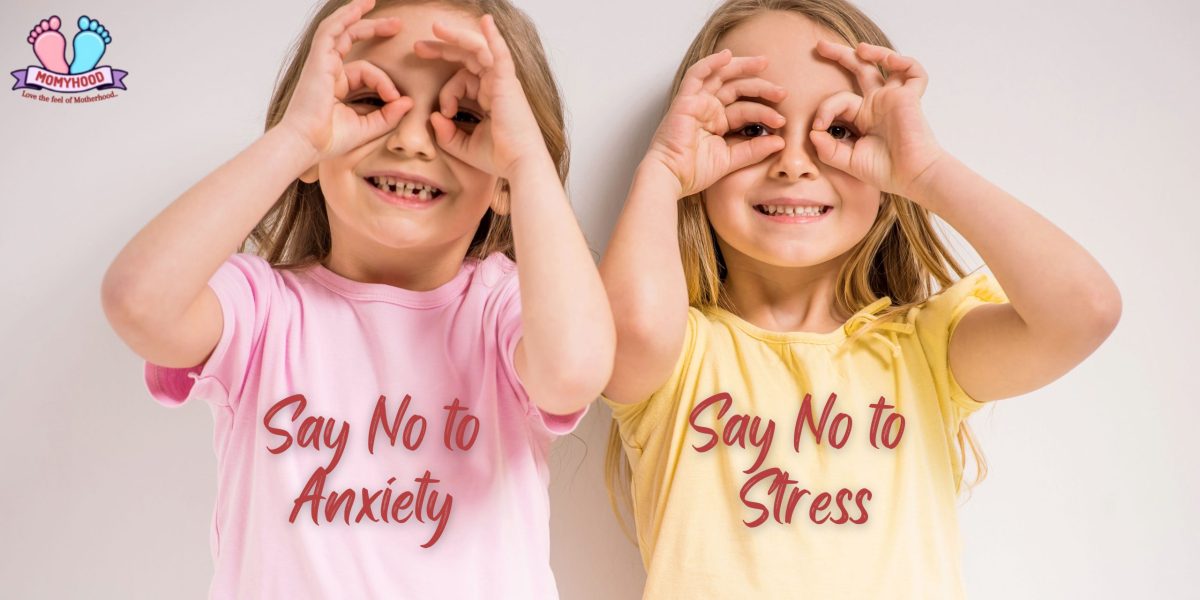Children’s anxiety and stress may show up in many different ways, including bodily (such as stomach pains and headaches) and mental (such as fear and concern), as well as behavioral symptoms (e.g. avoidance, irritability). Anxiety and stress are common in children for various reasons, including exposure to stressful media, abrupt changes in habits or surroundings, and traumatic life experiences.
Parents and other caretakers should know how to recognize the symptoms of anxiety and stress in kids and act accordingly by getting the kid some professional treatment if necessary. If the stress is not affecting their daily life, we can also treat their anxiety with talk therapy, and some behavioral & lifestyle modifications. I did some research & read many articles throughout the internet to know how can we cope with the stress & anxiety in kids. So, here I am sharing some of the techniques I found the best in dealing with the child’s worry and stress.
Tips To Reduce Anxiety & Stress In Kids
Encourage Open Communication
Open communication is one of the effective methods to minimize child anxiety. Children may express and understand their feelings in a safe and supportive environment. To encourage open communication, we should listen, validate their feelings, provide a non-judgmental environment, be patient, lead by example, show empathy, and frequently check in and talk about our children’s thoughts and feelings. These strategies build trust and help kids feel heard and understood, reducing anxiety and tension.
Create a Calm Environment
A calm atmosphere reduces children’s worry and tension. Reduce noise and distraction, provide a scheduled routine, encourage physical activity, and create a supportive atmosphere for the kids. Deep breathing and meditation can calm them and lessen stress. Parents may help children feel safe, secure, and equipped to handle daily life by establishing a serene environment.
Engage them in Daily Chores
Incorporating daily chores into your child’s routine can help reduce stress by teaching them valuable life skills, developing a sense of responsibility, and increasing their sense of accomplishment. Here are some daily chores that can help reduce stress in kids:
- Cleaning their room: Encouraging your child to keep their living space organized and tidy can help reduce stress by creating a calm and inviting environment.
- Cooking and meal preparation: By bonding with them over cooking and meal preparation, children can feel a sense of connection and support, which can also help reduce stress. Incorporating cooking into your child’s routine can provide a fun and educational activity that promotes mental and emotional well-being.
- Doing laundry: Teaching your child how to do laundry can help them develop independence and take pride in keeping themselves clean and presentable.
- Yard work: Engaging in yard work, such as watering plants or raking leaves, can help children release pent-up energy and feel more connected to nature.
- Pet care: If you have a pet, encouraging your child to help care for it can increase their sense of responsibility and foster a love for animals.
It’s important to keep the chores age-appropriate and to encourage and praise your child for their efforts. Incorporating daily chores into their routine can help your child develop a strong work ethic and increase their sense of accomplishment, which can help reduce stress and boost their self-esteem.
Encourage Self-care
By encouraging self-care, parents can help children to develop healthy habits and coping skills and to manage stress and anxiety positively and productively. Encouraging kids to pursue hobbies, spend time with friends, and engage in other enjoyable activities can also be beneficial. By prioritizing their own well-being, kids can build resilience and confidence and grow into happy, healthy adults.
📣 Loved what you read? Want to go deeper into conscious parenting? ✨ The Power of Manifestation in Parenting is now available — A soulful guide packed with real-life tools like affirmations, energy shifts, and sleep talk that I personally use with my son, Hitarth. 💛 Start your journey toward calmer, connected parenting today. 🎉 Launch Offer: Only ₹99 (limited-time price!) 📲 Instant download. No waiting. 👉 Grab your copy now!.
Teach Coping Skills
Kids must learn coping strategies to reduce worry and stress. Some examples are deep breathing, relaxation, problem-solving, and positive self-talk. Helping kids recognize their triggers and emotions and learn how to handle them is also beneficial. Parents can help them manage stress and emotions by teaching coping strategies. Regular practice helps improve resilience and reduce anxiety and stress.
Some effective coping skills include:
- Teach your child to take slow, deep breaths when they feel anxious.
- Encourage your child to think of multiple solutions to a problem and help them choose the best one.
- Teach your child to recognize negative self-talk and replace it with positive affirmations.
- Encourage your child to be present in the moment and focus on their senses, thoughts, and feelings.
- Encourage your child to talk about their worries with you or another trusted adult, and make time for fun and play with friends and family.
Maintain a Routine
Routines can help kids manage anxiety and stress. Structure, consistency, and security can help kids feel more in control and less overwhelmed. Sleep, eating, and activity schedules are some examples. Allowing them to rest or creative play also helps. By establishing a routine, parents can help kids handle anxiety and stress and feel more confident and peaceful. It’s important to be flexible and adjust the routine as needed, but having a general framework in place can help children feel more secure and less overwhelmed by life’s demands.
Engage in Physical Activity
Regular exercise can help kids lower anxiety and tension. Physical activity reduces stress, improves mood, and enhances well-being. Some examples are outdoor play, sports, dancing, and scheduled exercise. Encouraging youngsters to embrace physical exercise may make it fun. In addition, kids gain confidence and self-esteem via physical activity. Finally, parents may help kids build healthy habits and manage stress and anxiety by exercising regularly.
Limit Screen Time
Limiting screen time helps kids manage anxiety and stress. Screen usage can cause stress, anxiety, and insomnia. So limiting it can reduce these impacts. Physical activity, creative play, and social connection can also minimize screen usage and improve well-being. Moreover, less screen time can help kids build better behaviours, minimize stress exposure, and enhance sleep quality, reducing anxiety and stress.
Teach Problem-solving Skills
Teaching youngsters problem-solving skills reduces anxiety and stress. This may involve helping them understand why they are stressed or worried and creating effective solutions. Critical thinking, decision-making, and communication are problem-solving abilities. Encourage them to ask parents or instructors for help. These abilities can help kids develop emotional and mental health over time.
Promote healthy habits
Healthy practices help kids manage anxiety and stress very effectively. Encourage good eating, exercise, and sleep. Teaching deep breathing, awareness, and relaxation can also help. Art, music and athletics also work wonders. Parents may teach kids how to handle stress and anxiety by encouraging healthy habits. In addition, resilience and well-being can help them handle stress and uncertainty.
Limit Exposure to Stressors
Minimizing exposure to bad news and media, overly stimulating or stressful surroundings, and teaching children healthy methods to cope with unavoidable pressures might help. Setting screen time and technology limitations can also help. Parents may assist kids in managing stress and anxiety by reducing stressors. A supportive and encouraging environment can help youngsters acquire resilience and good coping abilities.
Practice Mindfulness
Practising mindfulness can help reduce anxiety and stress in kids by teaching them to focus on the present moment and calm their thoughts. Encourage deep breathing, yoga, or meditation. Help them identify and label their emotions and thoughts. Engage in mindful activities together, such as nature walks or colouring, to foster a sense of relaxation and awareness. By regularly practising mindfulness, kids can learn to manage stress healthily.
Encourage Playtime
Playing can help reduce anxiety and stress in kids by allowing them to express themselves and relieve pent-up emotions. Encourage activities they enjoy, whether sports, arts and crafts or imaginative play. Also, engaging in playtime with them can foster positive relationships and create a sense of security. Remember to make playtime a stress-free and enjoyable experience for them.
Build a Support System
Helping kids build meaningful relationships with peers, family, and trusted adults is one way. Encouraging them to ask for help can lessen stress and anxiety. A sense of community and togetherness may help build a support system in difficult circumstances. Parents can help children feel supported, valued, and loved and develop resilience and coping skills to manage stress and anxiety positively by developing a support system.
Consider Therapy/ Seek Professional Help
If your child’s anxiety or stress affects their daily life, it’s important to seek professional help. Your paediatrician or a mental health professional can provide additional support and guidance. Therapy can help children learn how to manage their anxiety and stress. A therapist can also teach children to identify and change negative thoughts and behaviours.
The Final Words
To summarize, dealing with anxiety and stress in children requires a combination of open communication, healthy coping skills, structure, and support. If your child’s anxiety or stress affects their daily life, it’s important to seek professional help. It’s even important to note that Every child is different, and what works for one child may not work for another, so be patient and flexible in finding the best approach for your child.
Be supportive and patient with your child as they learn to manage their anxiety. It may take time and practice, but they can overcome their anxiety with the right tools and support.
Your comments and shares do more than just support our blog—they uplift the amazing moms who share their stories here. Please scroll down to the end of the page to leave your thoughts, and use the buttons just below this line to share. Your support makes a big difference!


